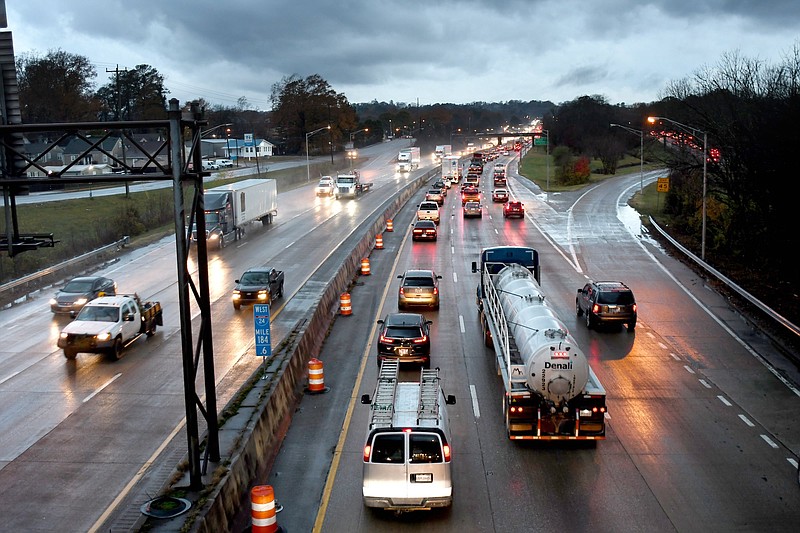NASHVILLE — Gov. Bill Lee's plan to contract with private companies to build express toll lanes to go alongside existing Tennessee freeways in urban areas barely scraped through the state Senate Transportation Committee on a 5-4 vote Wednesday.
The plan met bipartisan objections from critics who, among other things, said foreign companies would likely operate the tollways.
The criticism comes as the Republican governor seeks permission and authority to explore and ultimately enter into contractual agreements with private companies to build what the administration has sought to brand as "choice" lanes. The toll lanes, which motorists could choose to take or not, would be utilized in urban areas such as Metro Nashville and possibly Hamilton County.
Lee and his transportation commissioner, Butch Eley, said with a $26 billion backlog in state-funded projects, the public-private partnership agreements make sense. A number of states, including Georgia, have similar privately financed and operated special toll lanes.
Legislative critics complained in committee Wednesday, however, that the company running the venture will likely be foreign, citing the experience of other states. The Spanish company Abertis, for instance, owns toll facilities in Virginia.
Critics said Tennessee government could build and operate the lanes itself. And they said the state has squirreled away some $9 billion in surpluses, some of which could be used to alleviate traffic congestion without resorting to private vendors.
"I don't see any difference in us borrowing the money or hiring a middleman to borrow the money," Sen. Frank Niceley, R-Strawberry Plains, told Eley and other proponents.
Niceley cited a private toll operator in Indiana that went bankrupt in 2014 with some $6 billion in debt, according to news accounts. The company, ITR Concession, was owned by units of Spanish infrastructure company Ferrovial and Australian investment bank Macquarie Group, according to The Wall Street Journal.
"What happens when this foreign company is almost going broke?" Niceley asked. "Can we keep them from selling to China?"
Eley and others argued that U.S.-based firms are beginning to show interest after years of foreign investments.
Niceley also said while language in the proposed bill would allow Tennessee to maintain control over its current freeway lanes, the state would not be free to build additional ones -- a limitation that also concerned Sen. Heidi Campbell, D-Nashville.
Senate Transportation Committee Chairwoman Becky Duncan Massey, R-Knoxville, said she didn't have an answer to that but would get them one.
Asked later by the Chattanooga Times Free Press if the bill or subsequent contracts would allow or prohibit Tennessee government from adding new freeway lanes on its own or through contracts, Transportation Department of Transportation spokeswoman Beth Emmons said in an email that "this legislation does neither. It simply provides public-private partnership authorization for roads and bridges."
Earlier, Massey told committee members Tennessee is at a critical juncture when it comes to roads.
"We're fortunate to live in a state with so much going for us, a direct result of our sound economic policies, high quality of life and ranking as one of the lowest tax states in the country," Massey said.
She said while that yields economic opportunity, it also presents challenges in terms of Tennesseans being able to travel the state and be assured they can get there on time. Despite increasing gas and diesel taxes in 2017, the state is falling behind on projects because the levies are pegged at a flat rate per gallon and not applied as percentages.
"It is estimated that our congestion costs Tennessee drivers $800 million in lost productivity a year," Massey said. "This proposal modernizes our transportation infrastructure to address issues including traffic congestion."
While implementing the special toll lanes in some urban areas, Lee wants to invest more into rural and some suburban areas. The bill has support from the Tennessee Trucking Association. After some wrangling, Tennessee Road Builders Association leaders were assured they will participate in some 80% of the contracts involving the special lanes' construction.
Eley told the panel members their vote for the bill would not be in support of the "traditional notion" of toll roads in Tennessee.
"We will build additional lanes and capacity where people can choose to enter to use those lanes and pay a user fee," Eley said.
He said everyone knows the state's gas and fuel taxes as they are now aren't "long-term sustainable."
"We really are reaching a point of no return to where the time to act is now," Eley said, warning that if more isn't done for transportation funding, "all the positive things we're doing now will reach a screeching halt."
Massey said regarding the special lanes that when revenues reach a "certain level," the state will begin receiving a portion of the money.
Lee's budget calls for the state to inject a one-time, $3.3 billion subsidy from its general fund for state and local transportation needs. The package calls for higher fees on electric vehicles and new ones on hybrid vehicles to address losses in funding. The state is also seeking additional authority to deploy strategies to slash construction timelines and costs.
Campbell said the state's AAA bond rating could allow it to issue bonds to fund construction at low cost.
Saying "the devil is in the details," Campbell asked Massey to consider reassessing the privatization component before bringing the bill to the Senate floor.
"Our taxpayers don't want to be on the hook for funding private foreign interests, especially when we're relinquishing profit potential," Campbell said.
Lee never discussed transportation issues, let alone toll lanes, during his 2022 re-election campaign, raising it during his election night victory speech in early November.
He has since promoted it in appearances across the state, including an early January event in Chattanooga.
Contact Andy Sher at asher@timesfreepress.com.
